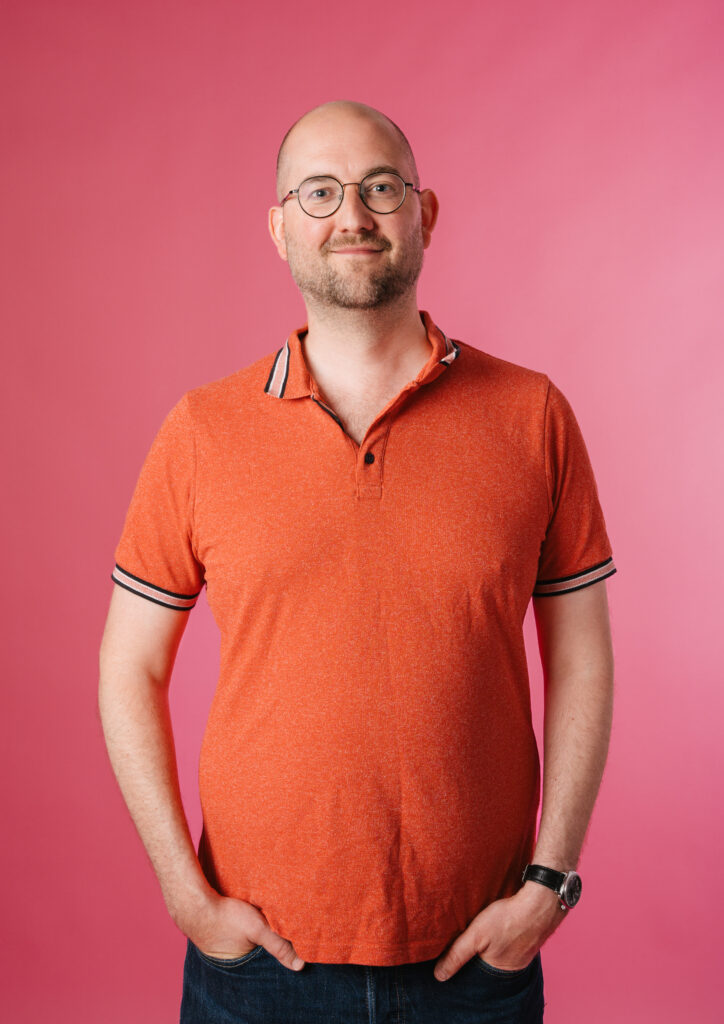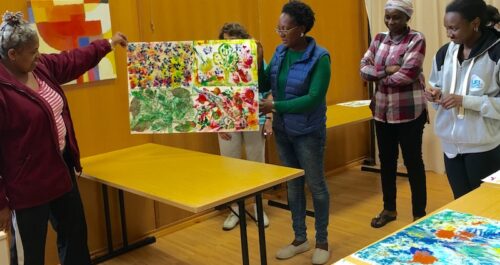

Alex Jamieson
AJ: Alex Jamieson
INT: Interviewer
INT: Can you tell me a little bit about your connection to Rosetta?
AJ: My name is Alex Jamieson. My connection to Rosetta goes back to when I started off in the Royal Docks Team in 2019. The Royal Docks expanded that summer the Team was set up in 2017. They did a big recruitment drive in 2019 and Rosetta was one of the first artistic and creative partners that I was introduced to during the course of my work – mostly through The Creative Newham Network that was being set up around trying to apply for funding, and so, Rosetta was clearly very active artistic organisation doing great work and great work with communities so, to be connected with them in terms of what we were trying to deliver in the docks was really important, so I originally met them through the network and came to some of those meetings. Subsequently, both the team and myself, have worked with Rosetta, in individual projects. For me, recently on the jubilee portraits last summer with photographer Sylvie who did great oral histories and portraits that still live on-line and it’s a great project! And we continue to work with Sylvia and on the Creative Producer Placement Programme where I worked and line-managed Amina Onitilo who is one of the producers recruited for that programme.
INT: Can you talk a little bit about your connection to Newham?
AJ: So, I’m not a resident of Newham, but I work at City Hall, and I live in Waltham Forest, so I do come to Newham quite a lot, particularly the west of the borough, Stratford and places like that, but I’m getting to know the borough through my work, particularly the docks. It’s nice to feel connected to the community, I’ve worked in the arts for a long time, gosh, 18 years, almost 20 years. And before that I worked in venues, theater primarily, and we had a very wide range of audiences form across the world, but it’s very nice to feel, in this work, that what I’m doing now to feel in touch with a particular area, both supporting work that comes out of it. That’s been exciting for me to meet all the people of various types. It’s been really nice to do that and learn about the different areas.
INT: Can you tell us about your background?
AJ: My job, immediately before I started was at the Barbican, the theatre and dance team, in various different roles for about 11 years, and before that I had a theatre company of my own which overlapped with my time in the Barbican, but I left them in 2012, so for 7 years and we made experimental theatre somewhere between live art and theatre, with a comedy vain, where I learned about producing and I carried that over to the Barbican. Now I work across visual arts and also I’ve been working a lot with English heritage which is why I worked with Rosetta on the Jubilee portraits project.
INT: Can you describe the changes that have taken place at area?
AJ: There are noticeable changes since I started in 2019 with the pandemic. There were blocks of time where we wouldn’t be able to come in and we worked remotely and when things began opening up into Canning Town down through the docks and to see the corridor of buildings that seem to shoot up overnight as I would not be there for months at a time. It’s a bit sort of shocking, but it has been exciting to see the opportunities those places have provided for organisations coming in and for homes for those organisations. I saw new organisation called Social Convention come I and now have a home in the docks as they didn’t have a place of their own, Obviously, I’m seeing that through the lenses of my work I guess, but often when I talk with locals there is an ambivalence when it’s on your doorstep and your home and how that must feel, and we have done some work round that with our heritage work with tentative excitement and oh, it’s also changing and what does this change mean for me? Another positive change I see is that people are starting to work together more. It was clear when I started. When I started there were lots of individuals in organisations that were at the coal face doing really important work, but were at the under-resourced, and increasingly I see people are starting to work together more and Rosetta have played a key part in that in helping bring people together with the creative Newham Network, but also Arts Council and The National Lottery Heritage Fund and other funding bodies that have made Newham a point of recognition in terms of a lack of recourses in the area. That’s a catalyst of capacity building and bringing people together in terms of providing specific Newham funding through the grants and working with the staff. Organisations have been directly able to apply to the funds themselves and be successful in getting support for that. It’s been nice to see resources get to the places that they need to. But, I do know those areas of focus are coming to an end, officially at least, so we need to feel mindful of that in a field where things seem even more precarious. So, lots of positive change in making sure people work together, but making sure people embed that change and keep delivering.
INT: …Heritage isn’t always documentable..
AJ: It can be hard to measure the positive change due to the nature of artistic work. It happens by its nature; we spend time thinking about how we can communicate that to bodies that we need to. Particularly for organisations like Rosetta that help deliver the ground work. It’s a constant battle of telling people exactly what the sector actually is, but some people do that very well.
INT: How do you evaluate work?
AJ: Some parts of the project are more readily seen, such as the public events stuff such as who has attended which is very important, setting up the project saying who you want it to be for and demonstrating it, and then talking about the work and who has made it. Yeah, and saying X amount of people for X group took part, but capturing that qualitative work aspects as well with testimonies and helps tell a more rounded story than just numbers and see the power of the creative sector to be transformative. You can’t tell start story just with the numbers. People tell a story of how its impacted them is really important.
There was an event, Creative Producer Partnership (for the Creative Producer Traineeship), where participants talked about the organisations they have been embedded with and how it had grown their confidence. That was a lovely event and helped communicate beyond the numbers.
One of my colleagues talked about glow moments which is very subjective thing for those that are involved in it. Like a young producer coming into the programme where it’s gonna change their career for instance, but they may want to engage for a day, but they engage for the length of the workshop. It’s all very hard to communicate to the powers that be.
INT: Can you talk about the future?
JA: I do feel like tentatively hopeful for it. Luckily, I work in a context where people who make the decisions (in The Royal Docks Team) where the board report to Newham Council who report to the GLA. Both of those organisations know about culture, so within my given context there is an immediate understanding of the area. We are both working under cultural strategies, New Council has one The Royal Docks has one, both of which work in the Mayor of London context as well. I have a certain amount of trepidation when The Arts Council and the NHS no longer see this as an area of interest for them, but I am very inspired by the people who work and live here and their capabilities.

